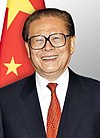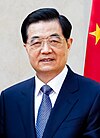|
Paramount leader
Paramount leader (Chinese: 最高领导人; pinyin: Zuìgāo Lǐngdǎorén; lit. 'highest leader') is an informal term for the most important political figure in the People's Republic of China (PRC). The paramount leader typically controls the Chinese Communist Party (CCP) and the People's Liberation Army (PLA), often holding the titles of CCP General Secretary and Chairman of the Central Military Commission (CMC).[1][2][3] The state representative (president) or head of government (premier) are not necessarily paramount leader—under China's party-state system, CCP roles are politically more important than state titles.[4] The paramount leader is not a formal position nor an office unto itself. The term gained prominence during the era of Deng Xiaoping (1978–1989), when he was able to wield political power without holding any official or formally significant party or government positions at any given time (state representative, head of government or leader of the CCP).[5] As the leader of the world's largest economy by GDP purchasing power parity (PPP), the second-largest economy by nominal GDP, and a potential superpower, the paramount leader is considered to be one of the world's most powerful political figures.[6][7][8] There has been significant overlap between paramount leader status and leadership core status, with a majority but not all of paramount leaders being also leadership cores, though they are separate concepts. The term has been used less frequently to describe Deng's successors, Jiang Zemin, Hu Jintao and Xi Jinping, who have all formally held the offices of General Secretary of the Chinese Communist Party (party leader), President of the People's Republic of China (state representative) and Chairman of the Central Military Commission (commander-in-chief). Jiang, Hu and Xi are therefore usually referred to as president in the international scene, the title used by most other republican heads of state.[4] However, Deng's successors derive their real power from the post of general secretary, which is the primary position in the Chinese power structure[9] and generally regarded by scholars as the post whose holder can be considered paramount leader.[10] The presidency is a largely ceremonial office according to the Constitution,[note 1] and the most powerful position in the Chinese political system is the CCP general secretary.[12] Xi Jinping is the current paramount leader.[13] He is considered to have taken on the role in November 2012, when he became CCP general secretary, rather than in March 2013 when he succeeded Hu Jintao as president.[14] HistoryChairman Mao Zedong was the undisputed ruler of Communist China from its beginning in 1949 and held three chairman offices at once: Chairman of the Chinese Communist Party, Chairman of the Central Military Commission and Chairman of the People's Republic of China (1954–59), making him the leader of the party, military and state, respectively. Following the Cultural Revolution, a rough consensus emerged within the party, that the worst excesses were caused by lack of checks and balances in the exercise of political power and the resulting "rule of personality" by Mao.[15] Beginning in the 1980s, the CCP leadership desired to prevent a single leader from rising above the party, as Chairman Mao had done. Accordingly, the post of CCP Chairman was abolished in 1982. Most of its functions were transferred to the revived post of General Secretary.[16] The leadership experimented with a quasi-separation of powers, whereby the offices of general secretary, president and premier were held by different people.[citation needed] In 1985, for example, the CCP General Secretary was Hu Yaobang, the Chinese President was Li Xiannian and the Chinese Premier was Zhao Ziyang. However, Deng Xiaoping was still recognized as the core of the leadership. Both Hu and Zhao fell out of favour in the late 1980s, but Deng was able to retain ultimate political control.[citation needed] In a discussion with Central Committee members in the lead-up 4th Plenum of the Thirteenth Central Committee (Jun. 23-24 1989), Deng Xiaoping introduced the concept of the "Core Leader". In his analysis, despite the existence of figures like Chen Duxiu, Qu Qiubai, Xiang Zhongfa, Li Lisan, and Wang Ming, the Party did not have a proper "Core Leader" until the ascent of Mao Zedong at the Zunyi Conference of 1935. Mao's election ushered in the "First Generation" of CCP leadership. As for the second generation, Deng conceded that in retrospect, he had himself been the "Core", but that he had been constantly planning for the transition to a third generation. For this purpose, he encouraged his audience to rally around Jiang Zemin as the core of the "Third Generation".[17] Despite Deng formally relinquishing the position of Chairman of the Central Military Commission until the 5th Plenum (Nov. 6-9 1989), official histories published by the CCP regard this endorsement, at the 4th Plenum, as the transition from the Deng administration to the Jiang administration.[citation needed] The paramount leader label has been applied to Deng's successors, Jiang Zemin and Hu Jintao, though it is generally recognized that they did not wield as much power as Deng despite their having held more offices of leadership. There has been a greater emphasis on collective leadership, whereby the top leader is a first among equals style figure, exercising power with the consensus of the CCP Politburo Standing Committee.[3] This was particularly apparent during the tenure of Hu Jintao.[note 2] Beginning in 1993, Jiang formally held the three offices that made him the head of the party, state, and military:
When Jiang left the offices of General Secretary and President in 2002 and 2003, respectively, he held onto the position of Chairman of the Central Military Commission. Military power had always been an important facet in the exercise of political power in Communist-ruled China and as such holding the top military post meant Jiang retained some formal power. When Jiang stepped down from his formal posts between 2002 and 2004, it was ambiguous who the paramount leader was. Hu Jintao held the same trio of positions during his years in power. Hu transferred all three positions onto his successor Xi Jinping between November 2012, when Xi became CCP General Secretary and Chairman of the Central Military Commission; and March 2013, when Xi became president. Since Xi's ascendance to power, two new bodies, the National Security Commission and Central Comprehensively Deepening Reforms Commission, have been established, ostensibly concentrating political power in the paramount leader to a greater degree than anyone since Deng.[19] These bodies were tasked with establishing the general policy direction for national security, as well as economic reform. Both groups are headed by the General Secretary.[20] List of paramount leaders
List of spouses of the paramount leaders/First Ladies of ChinaAll six leaders have had a spouse during their terms in office. The current First Lady is Peng Liyuan, wife of General Secretary Xi Jinping.
See also
Explanatory notes
References
|
|||||||||||||||||||||||||||||||||||||||||||||||||||||||||||||||||||||||||||||||||||||||||||||||||||||||||||||||||||||||||||||||||||||||||||||||||||||||||||||||||||||












